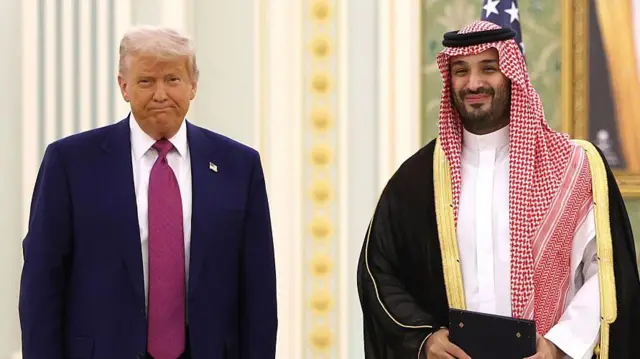The United States and Saudi Arabia have entered into a historic economic and military agreement valued at over $600 billion. This accord, referred to as the “largest defence deal in history,” was formalized during US President Donald Trump’s official visit to Riyadh. The agreement represents a significant transformation in the strategic and military dynamics of the Middle East and solidifies an enduring bilateral relationship that has lasted for eight decades.
The centrepiece of this extensive package is a landmark arms agreement, initially valued at approximately $110 billion, with prospective subsequent contracts potentially elevating the amount to nearly $350 billion over a decade. This armaments transfer is remarkable both in its financial magnitude and its strategic consequences. The agreement includes a comprehensive range of sophisticated armaments like as missile defence systems, tanks, artillery, naval vessels, radar technologies, and communication systems. It aims to substantially enhance Saudi Arabia’s military capabilities, providing the kingdom a considerable advantage in its regional security strategy, especially considering persistent tensions with Iran and the unstable circumstances in neighbouring Yemen.
This agreement transcends a mere arms transaction; it signifies an intensifying partnership between the United States and Saudi Arabia amid significant geopolitical turmoil in the Middle East. The accord is set against a backdrop of regional instability characterized by the enduring conflict in Gaza, ongoing Houthi rebel assaults in Yemen, and a protracted rivalry with Iran that influences the foreign policy of both Washington and Riyadh. Through this military enhancement, Saudi Arabia seeks to fortify its frontiers and establish itself as a preeminent military power in the Gulf area.
In addition to defence, the $600 billion package encompasses a comprehensive set of economic accords aimed at modernizing Saudi Arabia’s economy and strengthening economic relations between the two countries. Saudi investments will be directed towards multiple sectors of the US economy, encompassing aviation, healthcare, data centres, and mining. In contrast, American companies will receive enhanced access to the Saudi market in sectors including energy, infrastructure, and artificial intelligence. This dual-track collaboration corresponds with Saudi Arabia’s Vision 2030 project, an ambitious strategy aimed at diversifying the kingdom’s economy beyond oil dependency and establishing a viable post-oil future.
The collaboration on artificial intelligence and data centres indicates a progressive alliance that recognizes the increasing significance of technology in economic advancement and contemporary warfare. Cybersecurity, digital infrastructure, and AI-augmented defence systems are now regarded as essential to national security alongside conventional military assets. These initiatives highlight a dedication by both nations to preserve their longstanding alliance while adapting it to the requirements of the 21st century.
President Trump’s visit to Riyadh, his inaugural international travel since assuming office, also fulfilled a wider diplomatic objective. The timing was deliberate to reinforce US support for its Gulf partners despite increasing uncertainty regarding American commitment to the area following the Obama administration’s nuclear agreement with Iran. The extensive agreements established in Riyadh signify a clear shift towards a more militarized and economically interwoven partnership between the two nations, centred on mutual security interests.
The agreement has garnered praise in both Washington and Riyadh, however it has also faced criticism from certain factions. Human rights organizations and certain US Congress members have expressed apprehensions regarding Saudi Arabia’s involvement in the humanitarian situation in Yemen, where the Saudi-led coalition has been alleged to carry out airstrikes causing civilian casualties. Critics contend that inundating the country with sophisticated armaments without sufficient regulation may intensify the conflict and jeopardize peace prospects.
Advocates of the agreement contend that it fulfils a dual function: bolstering US defence sectors and discouraging Iranian aggression, which is perceived by numerous US partners in the region as the primary destabilizing entity. The agreement is anticipated to create tens of thousands of American jobs, especially in the defence manufacturing sector, so enhancing the domestic economy and fortifying a crucial industry.
The recent development in US-Saudi relations occurs while both nations are adjusting their foreign policy in reaction to changing global dynamics. The agreement reinforces the United States’ position as the principal security guarantee in the Middle East. For Saudi Arabia, it signifies a decisive advancement toward military autonomy and economic modernization.
The ratification of this unprecedented defence and economic package signifies a revitalized and enhanced alliance between the United States and Saudi Arabia. It has substantial ramifications for regional security, the global arms trade, and international diplomacy. The agreement poses intricate dilemmas regarding the equilibrium between security and human rights, yet its substantial scale and aspirations render it a pivotal moment in the strategic alliance between these two formidable states. This historic deal may serve as a foundational element in defining the geopolitical and economic landscape of the Middle East for decades as both countries anticipate the future.







